 Coffey ‘astonished’ at Bristol air pollution delay
Coffey ‘astonished’ at Bristol air pollution delay
Sun Jan 27, 2019 2:39 pm
Environment minister Therese Coffey has threatened Bristol mayor Marvin Rees with legal action if he does not meet new deadlines for a plan to tackle air pollution in the city.
In a letter published online, Dr Coffey said she was alarmed to hear that Bristol City Council had stated that it would not provide its outline business case until summer 2019, given that it was obliged under a ministerial direction to do so by the end of last year.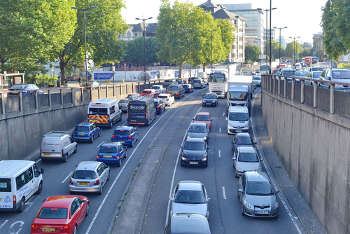
Traffic in Bristol
She wrote: ‘This means you have unlawfully failed to comply with the Direction, and I am absolutely astonished at your delay in improving air quality for the people of Bristol as quickly as possible.’
Dr Coffey told Mr Rees that she now requires by 21 February an outline business case ‘that justifies the proposed preferred scheme to deliver compliance based on full and complete analyses including air quality, transport, and economic modelling as well as setting out the procurement, implementation route and affordability of the scheme’.
She also specified that all necessary public consultation on the preferred scheme should commence by 29 March, with a full business case by 27 September.
Dr Coffey added: ‘I should like to make clear that any delay or non-compliance with these deadlines will result in my being forced to consider legal action against Bristol City Council which may include issuing proceedings without further notice.’
However, as Transport Network has reported, two other cities have recently escaped sanction after they repeatedly missed deadlines to draw up air quality plans, despite threats of ‘serious consequences’ from Dr Coffey.
A spokesperson for Bristol said it was ‘fully committed to tackling air quality’ and was carrying out technical modelling work to explore fully all possible options.
The spokesperson said: ‘We’ve been clear with the Government’s Joint Air Quality Unit that we will take the proposals forward and we are working to ensure that the potential solutions have the highest possible chance of success. We are therefore looking at the bigger picture including measures to cut congestion and improve public transport, infrastructure and traffic management.
‘Bristol is an inclusive city and we are determined that any proposed solutions do not have a negative impact on people on low incomes.’
Separately, ministers have approved Leeds City Council’s plan to implement a charging Clean Air Zone and provided £29m in funding.
The council had asked for £13m to cover infrastructure and operation costs and £27m to help businesses upgrade or retrofit affected vehicles. The council said that £23m of the £29m provided was to support businesses.
Cllr James Lewis, executive member with responsibility for sustainability and the environment, said: ‘We have not received the full amount of funding that we asked the Government for; however, we are pleased to confirm today that a number of significant financial support packages will be available to assist owners of affected vehicles. We will be working hard to make sure this money is available swiftly.'
 Analysis: Demand for airport parking across the UK
Analysis: Demand for airport parking across the UK
Sun Jan 27, 2019 2:41 pm
A recent study used figures from the Civil Aviation Authority, airport booking sites and Google search data to analyse UK airport parking demand, Kelly Edwards reports.
Commissioned by UK travel insurance provider Staysure, the study found a wide variance across the country. The data showed that only a small minority of travellers from Heathrow look for airport parking per year - just 0.83% - 647,000 out of 78 million. At the other end of the scale, the results for Bristol airport showed 10% of flyers looking for parking - 582,691 of 5,826,916 a year.So what’s behind this substantial variation?
There are a number of issues to consider when taking a more detailed look at the airports - including changes and differences in local social and economic infrastructure. When an airport has an exceptionally high level of demand for airport parking, this is an environmental concern which needs to be addressed.
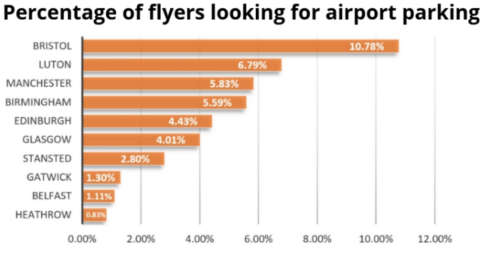
London airports
In comparison to the rest of the UK, London has much lower levels of car ownership. With the Congestion Zone, few and expensive car parking spaces and excellent public transport services such as the London Underground and night buses, there is no need to own a car.
Only London has a transport authority which links up suburban, underground and overground trains and also buses.
In fact, fewer young people in London have the incentive to drive a car and so they learn to drive at an older age when compared to the rest of the country - many only needing to learn to drive if they move out of London. Tourists visiting London will also not need to hire a car to get around.
In addition, the Mayor of London aims to further reduce cars in the city and increase all journeys in London made by public transport from the current 64% to 80% of journeys by 2041. Including car journeys to London airports, that would be 3 million fewer car journeys per day.
Electric car schemes are also gaining popularity with car hire schemes for journeys to and from London airports. Gatwick airport is also making an effort to use electric vehicles for the operation of the airport.
However, if the London mayor’s goal is to be met, more needs to be done - the public transport links are not good enough.
Despite major investment to all of the rail and coach links to London airports, concerning reportssuggest that passengers from London airports between 2012-2016 were more likely to travel to the airport by car than they were seven years ago - this is because cabs are within those figures - which are more popular in a city like London than driving your own car.
The exception was Stansted and this was said to be due to recently improved new coach connections.
Passengers will be reluctant to use public transport if they see it as an added hassle or unreliable. Therefore potential improvements include an extension of Oyster or contactless payment for rail tickets and contactless payment on buses outside London.
Heathrow and Gatwick airports benefit from an Oyster card reader, but not Stansted where the number of travellers fined for using their Oyster card by mistake had increased from around zero to 16,000 in just two years.
The opening of Crossrail could also further decrease the number of travellers using a car to get to Heathrow and therefore search for airport parking.
Crossrail trains from Liverpool Street or Canary Wharf to Heathrow Terminal 5 will take under 50 minutes. This is an improvement on the London Underground and the expensive Heathrow Express.
Despite the highest volume of passengers, it makes sense that London has fewer people looking for a car parking space at Heathrow - but there are still improvements to be made to public transport to further discourage the increasing use of cars and taxis.
Airports outside London
Airports outside London have a dire shortage of public transport links and with cuts in local budgets, bus services outside London are being stopped or abandoned altogether.
In the last ten years 134 million miles of bus routes have been lost outside London.
Skelmersdale is a typical example of a northern town which is located less than half an hour from Liverpool by car, but it takes two hours by bus and train as the service is slow and the timetables are not integrated.
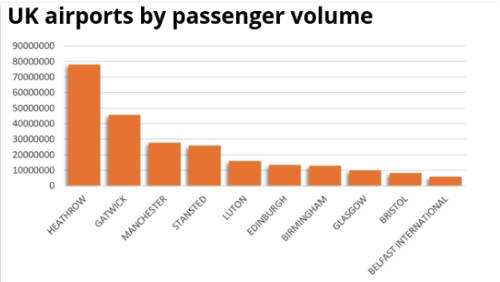
Bristol airport has people driving from as far as South Wales and Dorset. The Staysure study data showed that one in 10 flyers looking at Bristol airport are searching for parking. This was the highest number of flyers looking to park their car at the airport when compared to the other UK airports.
There are reports of travellers leaving their cars in the surrounding residential and country lanes around Bristol airport, rather than pay the fees or compete with other passengers at the Bristol airport car parks. One field near the village of Felton filled up with as many as 500 cars in August last year.
Lulsgate and other villages near Bristol airport also have a problem with unauthorised car parks, luring airport travellers with much cheaper rates than the airport car parks.
Campaigners against the Bristol airport expansion into the greenbelt feel that the expansion is not to satisfy a higher demand for more flights, but instead purely based on attempts to gain more parking profits. Rather than expand the airport for flights, they have a need to expand the parking operation.
Campaigners argue that roads around Bristol airport on the A38 are already congested and the expansion will simply add to the gridlock.
Although Bristol airport doesn’t have a rail link, the Bristol Airport Flyer offers fast bus services to both Bristol and Weston-super-Mare to and from the terminal at all times of day and night.
Perhaps more needs to be done to encourage travellers to use it rather than park their car in an unauthorized location.
Uber has led to a decrease in those seeking airport parking for the convenience of having an Uber driver drop you off right by the terminal doors for an inexpensive fare. Uber has been popular in London for a few years now and other UK areas are catching up. In Wales there is a competitor to Uber ‘Ola’ so this is a market that will continue to take over.
Conclusion
Levels of demand for airport parking need to be closely monitored and money invested on public transport provision.
If all airports can decrease the number of flyers driving themselves to and from the airport, the car park land could also be put to better use - perhaps free drop off areas for Uber cabs and car shares or electric car park charge sites - and in doing so the threat of taking up more green belt land would be avoided.
 Traffex 2019: Technology driving change
Traffex 2019: Technology driving change
Sun Jan 27, 2019 2:47 pm
In early April, more than 10,000 movers and shakers in the world of highways and transport will converge at the NEC for Traffex 2019 and Parkex 2019, where 350 exhibitors will showcase the latest products, concepts and services.
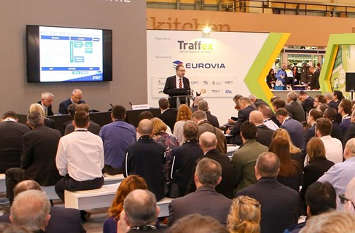
The centre of the all-new show features an interactive journey, taking visitors through the evolution of road maintenance and design and giving a glimpse of the future – a theme that will be echoed on 4 April: 'Futures Day'.
Keynote speakers
Keynote speakers in the two theatres include Jim O’Sullivan, chief executive of Highways England, and Lilian Greenwood MP, chair of the Transport Select Committee.
Themes
The Traffex Theatre takes a strategic look at funding, future-proofing the transport network and getting investment for new technology.
Sessions on the theme of 'Changing The Way We Travel' feature a range of experts from local authorities across the country on ways they are working to reduce reliance on the private car, and what these policies mean for the industry.
The Highways and Transport Theatre hones in on the day-to-day issues surrounding the industry, hosted in association with a number of key industry bodies.
Futures Day in this arena is dedicated to the next generation of workers in the industry, focusing on recruitment and the best form of training. Delegates will also hear from the Traffex/ITS (UK) student essay winners.
'There has been phenomenal change in the highways and transport sector, and dramatic cuts to local authority budget have actually prompted widespread innovation,' said Adrian Tatum, Traffex director.
'The emphasis has clearly switched to collaboration and harnessing technology to drive change on the road network.'
What to look out for
The three-day event also features:
- Two conference theatres delivering the latest strategic high-level thinking and best practice operation delivery via case studies, technical session and debate and discussion and covering every sector of the highways and transport sector
- Live hackathon - the Data Discovery Centre - using real industry data to help create solutions for challenges on the network
- A series of briefings for local authority and private sector directors to help them develop and deliver more efficient and effective services and create better places to live and work
- A series of invitation-only round table debates reflecting the latest thinking
- Exhibitors’ drinks reception
- Networking Traffex dinner
- Traffex-themed bars around Birmingham
'For three days, Traffex becomes the hub of everything highways and transport,' Mr Tatum said.
'It’s a trading floor for global business deals, a centre of excellence for all things new, a great networking opportunity – and of course in the centre of the UK.'
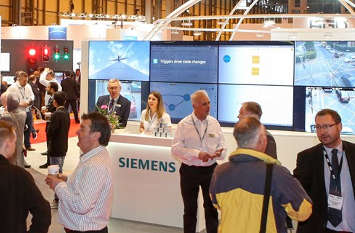
Dave Wright, executive director at Kier Highways, a major exhibitor at the event, said: 'We’re really looking forward to being part of Traffex again to showcase some of our latest highways innovations that maximise the use of technology and will continue to drive our industry forward.
'We have worked collaboratively with our clients and supply chain to deliver all of our innovations on show to improve safety for our road workers and for road users, drive efficiency and enhance the road network for the end user. We’re also looking forward to seeing the other innovative technologies showcased by our peers in the sector. It’s a very exciting time to be part of the highways industry.'
Matthew Vincent, sales and marketing director at Intelligent Traffic Systems for Siemens Mobility Limited, said: 'Siemens has exhibited at Traffex for over 20 years now and that in itself highlights the value it offers our business. It is a show that isn’t just about products on a stand. It’s very much a forum for engagement and helps start and develop the conversation on how Siemens can help customers better meet the demands of the travelling public.
'For us it is all about maximising return on investment, whilst keeping people safe, making our roads more efficient and reducing emissions as much as possible – all of these areas are explored at Traffex and I’m looking forward to the 2019 event.'
Parkex
Held alongside Traffex will be Parkex, Europe’s largest dedicated parking event. Organised in collaboration with the British Parking Association, Parkex provides a platform for leading industry suppliers and parking brands to launch the latest cutting edge products and services.
With over 10,000 professionals expected to attend, there will be plenty to see at year’s Traffex and Parkex. Visiting is free but pre-registration is essential via this link
Exhibitors at Traffex and Parkex are invited to an open day at the NEC on 13 February to hear how TRAFFEX 2019 is changing and exhibitors could benefit from these changes.
It’s an informal opportunity to the Transport Network team, talk to the magazine editors, find out what other exhibitors are planning, who's visiting and discuss how to attract visitors to your stand.
 Re: Coffey ‘astonished’ at Bristol air pollution delay
Re: Coffey ‘astonished’ at Bristol air pollution delay
Sun Jan 27, 2019 3:37 pm
Wheelhouse ready for uncharted waters on £370m ferry contract
Wheelhouse ready for uncharted waters on £370m ferry contractWheelhouse ready for uncharted waters on £370m ferry contractWheelhouse ready for uncharted waters on £370m ferry contract
Serco, which runs NorthLink Ferries, and CalMac, which is owned by the Scottish government, are thought to be in the running. The name of the third company has not been released.
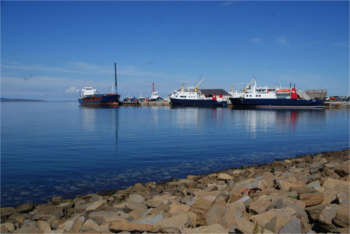
The decision to put the contract out to tender rather than deliver it in-house was announced last year. Scottish ministers said it had become clear that the preference of the local communities was for the contract to go out to market.
The winning company will operate ferry services to or from harbours in Aberdeen, Kirkwall, Lerwick, Scrabster and Stromness.
The existing public services contract expires on 31 October this year and the new deal will run for a maximum of eight years; an initial six with the chance for a two-year extension.
Minister for energy, connectivity and the islands, Paul Wheelhouse, said: 'A key benefit of this new contract is the in-built flexibility, allowing the ferry services to be amended to reflect future changes in demand across the important sectors of the islands’ economies – tourism, fishing, food and drink, aquaculture and farming.
'Scottish ministers will also retain control of all of important issues, such as fares and timetables, through the public service contract.'
The contract value may increase should additional tonnage and/or additional routes be introduced during the contract period in order to meet future service needs.
Wheelhouse ready for uncharted waters on £370m ferry contractWheelhouse ready for uncharted waters on £370m ferry contractWheelhouse ready for uncharted waters on £370m ferry contract
The invitation to tender has been released for an estimated £370m contract to operate the Northern Isles Ferry Services, which is designed to adapt to changes in demand.
Three bidders are reported to be involved in talks with Transport Scotland.Serco, which runs NorthLink Ferries, and CalMac, which is owned by the Scottish government, are thought to be in the running. The name of the third company has not been released.

The decision to put the contract out to tender rather than deliver it in-house was announced last year. Scottish ministers said it had become clear that the preference of the local communities was for the contract to go out to market.
The winning company will operate ferry services to or from harbours in Aberdeen, Kirkwall, Lerwick, Scrabster and Stromness.
The existing public services contract expires on 31 October this year and the new deal will run for a maximum of eight years; an initial six with the chance for a two-year extension.
Minister for energy, connectivity and the islands, Paul Wheelhouse, said: 'A key benefit of this new contract is the in-built flexibility, allowing the ferry services to be amended to reflect future changes in demand across the important sectors of the islands’ economies – tourism, fishing, food and drink, aquaculture and farming.
'Scottish ministers will also retain control of all of important issues, such as fares and timetables, through the public service contract.'
The contract value may increase should additional tonnage and/or additional routes be introduced during the contract period in order to meet future service needs.
 Is the funding review fair?
Is the funding review fair?
Sun Jan 27, 2019 6:21 pm
The Government’s plans to bring in a new distribution model for the cash delivered under the local government finance settlement have proved controversial and, given the complexity of the issue, were always likely to be.
When things get too much for rocket scientists or brain surgeons, perhaps they say to each other, ‘come on guys it’s not local government finance.' Or perhaps not. Either way, the situation is a complicated one.Local government receives a finance settlement from communities department MHCLG, which allocates the cash individually: ‘At present, 15 relative need formulas and several tailored distributions for services previously supported by specific grants are used to determine annual funding allocations for each local authority across England. These formulas involve over 120 indicators of “need”, reflecting factors previously identified as driving the costs of service delivery.’
This is the MHCLG putting the situation in its simplest terms. As a result of the increasing devolution of cash to local authorities, particularly from business rates, which saw a 50% retention rate from 2013-14, the Government has launched a consultation on reforming the system under what has been called the ‘Fair Funding Review’.
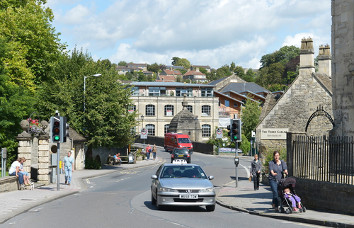
The review has already been labelled a ‘stitch-up’ by Labour dominated Northern cities and metropolitan councils, who have accused the Government of using it to push forward plans that would redistribute cash to Conservative heartlands.
The plan would be to distribute cash under a basic ‘funding formula designed primarily on a per capita basis - except for London Boroughs, who will have an adjustment to account for some services being provided by the Greater London Authority - with an Area Cost Adjustment applied. In this the government is moving away from adding in deprivation as a factor in grant funding.
The Government’s response to the consultation in late December argued that Population alone explained 88.1% of all variation in past expenditure at upper tier level and 84.0% of variation in the lower tier Foundation Formula.
Adding deprivation as an additional cost driver increased the proportion of all variation explained by explained by 4% at upper tier and 0.4% at the lower tier, and fixed costs explained an additional 1.4%.
Highways is one of the more technical areas that the Government agreed required a specific approach. Highways maintenance is one area that had traditionally received revenue funding for highways under the purview of the local government department.
Ministers had suggested that road length, traffic flow, and forecast snow days/predicted grit days would be used for this specific distribution formula but then concluded against the inclusion of winter service.
The Government response stated: ‘The Government agrees with the broad consensus behind Road Length and Traffic Flow as the main cost drivers for Highways Maintenance and therefore intends to implement a straightforward formula for this service area that incorporates these two cost drivers. Other cost drivers that were tested did not significantly improve the precision of the formula.’
According to the MHCLG ‘78% of respondents agreed or broadly agreed that these were the correct cost drivers for highways maintenance and public transport, only 2% disagreed’. However, it also conceded that ‘many respondents felt that there were additional factors which should be added to a highways maintenance and public transport formula’.
‘For highways maintenance, there was some consensus around the use of road class (20%), other weather factors such as flooding (14%), highway assets (14%) and all traffic flow (11%). Sources in the sector point out that there was scant modelling or technical information in the consultation document, with little to explain why highways maintenance distribution from MHCLG should be limited to just two factors.
The Rural Services Network, which has scores of rural local authority members, appears to fully support the changes to the highways maintenance formula. Sources suggest they feel the ‘simpler formula means the cost of maintaining a road will be funded at the same rate in both rural or urban locations’.
‘The current formula applies an arbitrary uplift to urban roads without any justification or evidence.’
However it did raise concerns over the decision to drop winter service as a factor in distribution, stating that it can have a ‘significant cost in some rural authorities, particularly those with large upland areas’.
‘We should urge the MHCLG to engage with these authorities to understand the additional costs associated with winter services. If these cost can be shown to be material, MHCLG should consider reintroducing a suitable indicator.’
In terms of local bus transport, the Government has suggested that this may not even be given a specific factor set.
‘The Government is minded to include Concessionary Travel within the upper tier Foundation Formula on the basis that this would introduce further simplicity and transparency into the relative needs assessment. The Government will, however, carry out further analysis on potential alternative approaches in order to determine whether this approach adequately reflects local authorities’ relative needs.’
It added: ‘Given the overall scale and distribution of expenditure for this service area, the Government does not believe that it is proportionate to introduce a specific funding formula for this service area. However, including this in the upper tier Foundation Formula so that it is broadly distributed on a ‘per capita’ basis, with a new ‘Area Cost Adjustment’, means that the funding for this service area will be distributed according to the characteristics of local authority areas and not directly linked to historical decisions about funding levels.’
John Lamb, president of the Local Government Technical Advisers Group, suggested this issue ‘could be helpfully influenced by engagement with bus operators’.
He pointed out: ‘There is a major focus here on concessionary bus cost but this is only part of the bus ‘offer’ albeit vital to local communities. Moreover local councils have removed significant funding for socially necessary bus services and these have had large components of concessionary fare users. The sector continues to call for a full and substantive consideration on concessionary fares scheme and sees a potential lost opportunity.’
On flood resilience and coastal erosion, the Government conceded that this areas could be minimal overall in terms of spending but have huge costs to targeted areas. MHCLG officials said that more analysis was needed.
The ministry stated: ‘Spending patterns suggest separate flood defence and coastal protection relative needs formulas could be introduced for lower tier authorities. After initial analysis, the Government has identified the cost drivers it believes are the most significant cost drivers for flood defence and for coastal protection in its accompanying consultation. The Government will use local authority-level expenditure-based regression as the basis for further analytical work to determine whether these are the most appropriate cost drivers, before taking a view on the best approach.
‘However, the Government is minded to incorporate upper tier flood defence and coastal protection within the upper tier Foundation Formula, on the basis of overall scale of expenditure and the distribution of relative needs.’
The Local Government Association is currently finalising its response to the Government’s plans.
A spokesperson for the MHCLG said: ‘We have launched a consultation seeking views on what factors to include in a new funding formula. This is a complex piece of work and we will take the time to get it right. We have been clear that this is a review of the relative needs and resources of local authorities.’
Permissions in this forum:
You cannot reply to topics in this forum|
|
|


